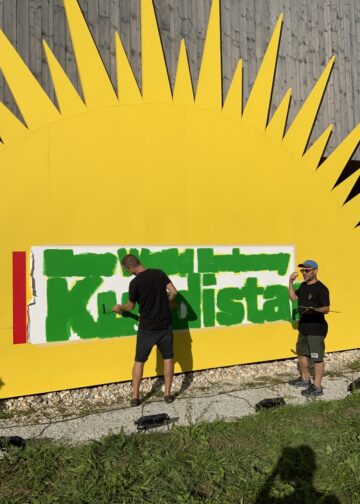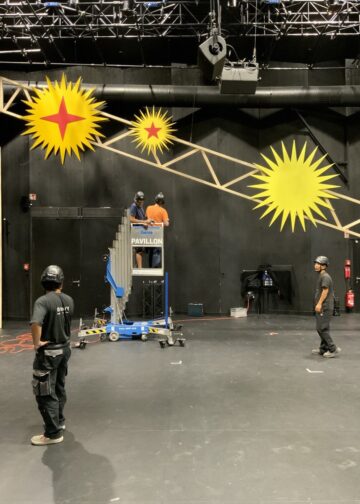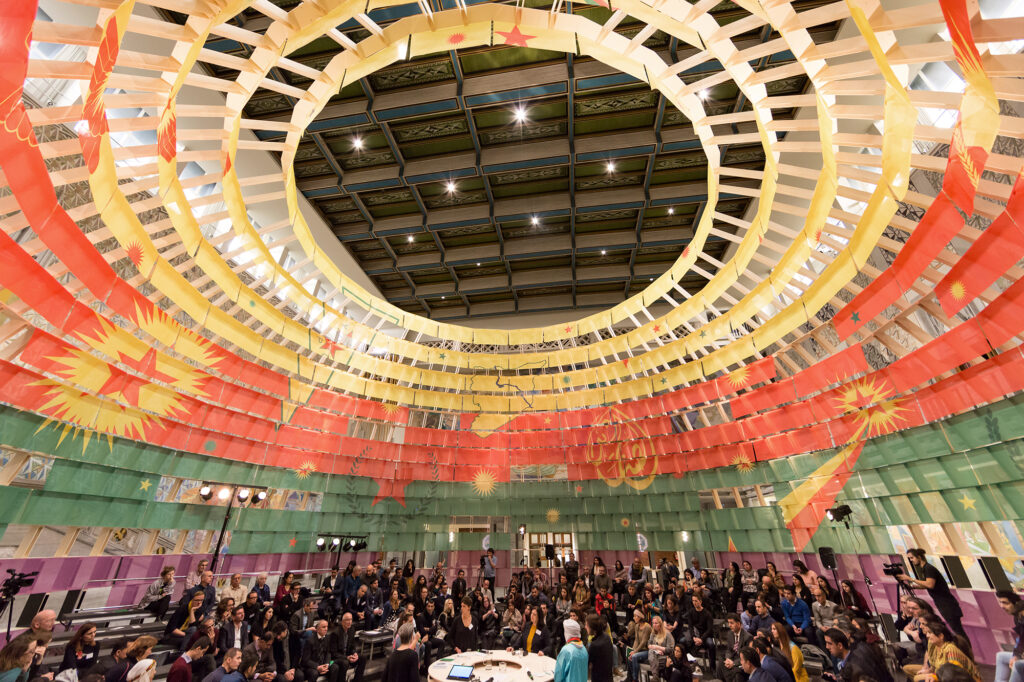🎙️#PODCAST | ‘New World Embassy’ in Lausanne will explore stateless democracy
🎧The 'New World Embassy' in Lausanne explores the Kurdish experience of statelessness and imagines new forms of non-state democracy.#StatelessDemocracy | @nilkoc50https://t.co/y1rzXTaINv pic.twitter.com/3QAGkTYRz8
— MedyaNews (@1MedyaNews) September 22, 2023
This weekend, a ‘New World Embassy’ will be temporarily established in the Swiss city of Lausanne, in a theatre project uniting Kurdish and international politicians, experts and artists to address questions of stateless democracy and solidarity. The project, devised by acclaimed artist Jonas Staal and Nilufer Koç, member of the National Congress of Kurdistan, takes place a century on from the signing of the Lausanne Treaty, which the co-creators says “dismantled the Ottoman Middle East and refused a nation to the Kurdish people by dislocating its traditional territory into the new entities that would become Turkey, Syria, Iran and Iraq.”
Staal has previously collaborated with the Kurdish political movement on other similar artistic interventions. The 23-24 September event at the Vichy Theatre, which will also be streamed live on Vimeo, will both address the current situation in which the Kurds are establishing an experimental, extranational, local and feminist democracy in Rojava despite persecution and attacks by ISIS and Turkey, and create a speculative space in which to explore and imagine new forms of non-state democracy. Representatives from all four parts of Kurdistan will join those from Western Sahara, India, Bangladesh, Lebanon, and Europe.
Medya News spoke to both Staal and Koç to learn more. Selected highlights follow, and you can watch the full video above.
Can you explain the vision behind the project?
JS: What Nilufer and I worked on is a project called “New World Embassy: Kurdistan”. It’s essentially a temporary embassy, where we’ve transformed Lausanne theatre, and for two days representatives of all four parts of Kurdistan will gather with representatives of other progressive political movements, diplomats, stateless and indigenous movements, and solidarity movements, and the public at large, to discuss how political alternatives that were developed in the past century by the Kurdish revolutionary movement can stand as an alternative to the state.


Are you suggesting there are positive new ideas and approaches that can emerge from the Kurds’ experience of statelessness?
JS: This is always a difficult question, because we can’t negate the sacrifice and violence brought by 100 years of statelessness for the Kurds, and other stateless people around the world: the radical precarity and violence that one is exposed to when one is forced into a position of statelessness is nothing to romanticise, just as the Kurdish revolutionary movement is no utopia. Every idea that emerged from it was paid for with the greatest imaginable sacrifice.
Nonetheless it’s true, as my collaborator Nilufer also says, that while the Lausanne Treaty represents this statist-imperialist reorganisation of the world, and the enormous, mass-force extermination of people and their cultures, it also pushed for new opposition ideas, new imaginaries that would run counter to a statist world order. That’s what the concept of stateless democracy represents.

Does the project in Lausanne model ideas you’d like to see replicated in real-world politics?
NK: With the whole architecture and design of the building, we’ll show that we are looking for a colourful world and future. We gave freedom to our fantasies about our alternative, showing the people how beautiful politics can be. If understood correctly, it has a responsibility to society, to the grassroots. Many citizens, even in Europe, have lost trust in politics, since politics became a game for interests and profit. We say: this is not politics. Politics is when the grass-roots can express themselves in their autonomy, according to their own needs, acting for something they want to have. Politics is nothing abstract, politics is not just the government, politics is not going to vote every four years. Politics is every day, deciding what you want to do tomorrow.
How will your international guests contribute to the discussion around these ideas?
NK: In former projects by Jonas, most ambassadors and chairs were Kurds. This time, we said that the idea of democratic confederalism is spreading. Many people have read Öcalan’s theories concerning the project of democratic confederalism, particularly following the revolution in Rojava. We said that there is now an international contribution to this idea. Groups from different places in the world have been talking about this idea.
The other point is that while the circumstances faced by the Kurds might be different from our friends in Europe, in the end then nationalism challenges us, via the Turkish regime, but also via the right-wing tendency in European countries which is producing nationalism. It’s also a European problem for the progressive forces. Also, misogyny and sexism is increasing, which in our country has a political aim led by the Turkish-Islamic synthesis, but also here in Europe, with domestic and structural violence against women increasing due to the neoliberal economy.










